Apicoectomy
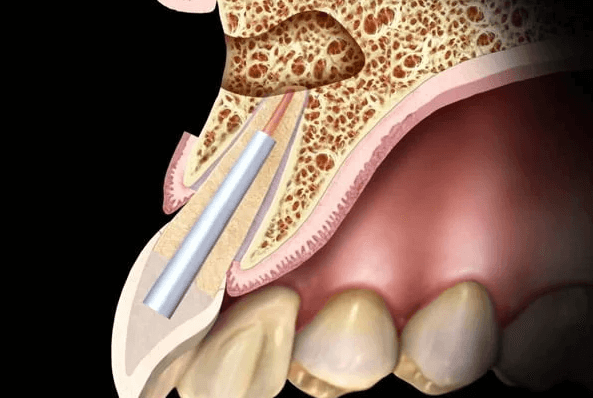
What Is Apicoectomy?
Apicoectomy, also known as root-end resection, is a surgical dental procedure aimed at treating infections or inflammation in the roots of a tooth. It is typically performed when a standard root canal treatment is unsuccessful in resolving the issue. During an apicoectomy, the tip of the tooth’s root, called the apex, along with any infected tissue, is removed. This procedure is commonly recommended to save a tooth from extraction and alleviate discomfort caused by persistent dental problems.
Before deciding on whether Apicoectomy are right for you, there are some things you should know:
- Who Needs Apicoectomy?
- What Are The Indications For Apicoectomy?
- What Are The Advantages Of Apicoectomy?
- What Are The Alternative Treatments If I Do Not Choose Apicoectomy?
- What Are The Costs Of Apicoectomy?
- What Are The Steps In The Apicoectomy Procedure?
- How Long Does Apicoectomy Last?
If you have any further questions about Apicoectomy or other dental services offered at Atlas Dental, please contact us.

Free phone consultation
Have questions about Apicoectomy? Schedule a free phone consultation with our Toronto dentist.

5 star google reviews
See for yourself why more and more people are choosing our dental office for Apicoectomy treatment.

Emergency dental care
Have a previously root canal treated tooth and think you need Apicoectomy treatment? Book online for an exam.
Who Needs Apicoectomy?
Apicoectomy is typically recommended for individuals who have persistent infections or inflammation in the roots of their teeth, particularly after undergoing a root canal treatment. Here are some situations where a dentist or endodontist might suggest an apicoectomy:
- Persistent Infections: Despite a root canal procedure, if an infection continues to affect the tooth’s root, an apicoectomy may be necessary to remove any remaining infected tissue.
- Recurrent Symptoms: Patients experiencing recurring symptoms such as pain, swelling, or abscesses around a previously treated tooth may benefit from an apicoectomy to address underlying issues.
- Complex Root Anatomy: In some cases, the anatomy of the tooth’s roots may pose challenges during a standard root canal treatment, making an apicoectomy the preferred option for effectively treating the infection.
- Inaccessibility: Teeth located in areas difficult to access through traditional root canal methods may require an apicoectomy to thoroughly clean and treat the affected root tip.
- Preserving Natural Teeth: Apicoectomy is often recommended as an alternative to tooth extraction, allowing patients to maintain their natural teeth and avoid the need for replacement with prosthetics such as dental implants or bridges.
Understanding who may benefit from an apicoectomy helps individuals make informed decisions about their dental care and ensures appropriate treatment for persistent dental issues. If you have further questions about Apicoectomy, please contact us.
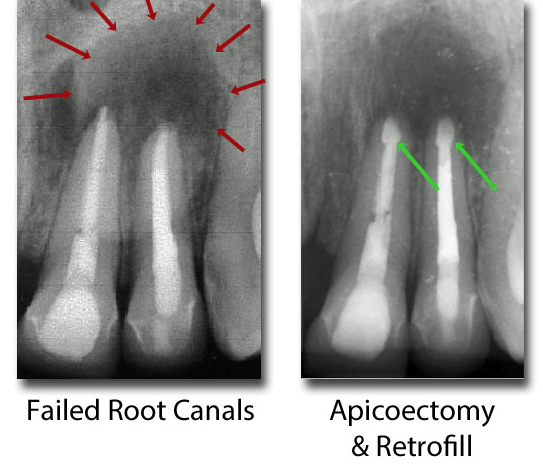
What Are The Indications For Apicoectomy?
Apicoectomy is indicated in specific situations where traditional root canal therapy is unsuccessful. Here are some common reasons for this surgical intervention:
- Persistent Infection: If the root canal system remains infected after treatment, an apicoectomy may be necessary to eliminate the source of the infection.
- Presence of Apical Lesions: Radiographic imaging may reveal lesions or cysts at the tooth’s root tip, indicating a need for surgical intervention.
- Anatomical Challenges: Teeth with complex root structures may benefit from an apicoectomy to ensure effective removal of infected tissue.
- Preservation of Natural Teeth: Apicoectomy is a conservative option to preserve natural teeth and avoid extraction, especially when the tooth can still function effectively.
By recognizing these indications for apicoectomy, dental professionals can accurately assess the appropriateness of the procedure for individual patients, ensuring optimal outcomes and long-term dental health. If you have further questions about Apicoectomy, please contact us.
What Are The Advantages Of Apicoectomy?
Apicoectomy offers several advantages as a treatment option for dental conditions, especially when traditional root canal therapy fails. Here are key benefits:
- Preservation of Natural Teeth: Apicoectomy removes infected tissue while retaining the tooth structure, helping maintain oral function and aesthetics.
- Effective Resolution of Infections: This procedure allows for thorough removal of infected tissue and associated lesions, leading to better outcomes compared to standard root canal therapy.
- Prevention of Tooth Loss: By addressing underlying issues, apicoectomy helps avoid tooth extraction and the complications that come with it.
- Improved Long-Term Success Rates: Research shows favorable long-term success rates for apicoectomy, particularly in complex cases.
- Minimally Invasive Procedure: Compared to tooth extraction, apicoectomy is less invasive, typically resulting in less discomfort and shorter recovery times.
- Enhanced Patient Comfort: Advancements in dental technology have made apicoectomy procedures more precise, reducing trauma to surrounding tissues.
Understanding the advantages of apicoectomy empowers patients to make informed decisions about their dental care. If you have further questions about Apicoectomy, please contact us.
What Are The Alternative Treatments If I Do Not Choose Apicoectomy?
If apicoectomy is not the preferred treatment for your dental condition, consider these alternatives based on your specific circumstances:
- Root Canal Retreatment: If previous root canal treatment failed, your dentist may recommend retreatment, which involves cleaning and sealing the root canal system again.
- Extraction and Replacement: In cases where the tooth cannot be saved, extraction followed by replacement with a dental implant, dental bridge, or removable prosthesis.
Ultimately, the choice of treatment depends on various factors, including the severity of your condition and long-term oral health goals. Discuss these alternatives with your dental provider to determine the best course of action. If you have further questions about Apicoectomy, please contact us.
Cost of Apicoectomy
Apicoectomy is a surgical dental procedure to save failed root canal treated teeth by sectioning off and back-filling the tips of the roots. The charge per tooth depends on the number of canals being retrofilled. Therefore, the cost of apicoectomy treatment can range from $1722 to 2169. The codes relevant to apicoectomy treatment in the Ontario Dental Association’s Suggested Fee Guide appear as follows::
Apicoectomy/Apical Curettage + Retrofilling + Guided Tissue Regeneration With Resorbable Membrane, Per Site + Material Expense
- One canal – 34111 + 34211 + 42702 + 99555: $1722
- Two canals – 34122 + 34222 + 42702 + 99555: $1913
- Three canals – 34133 + 34233 + 42702 + 99555: $2041
- Four canals – 34134 + 34234 + 42702 + 99555: $2169
Apicoectomy therapy is sometimes considered a supplementary service by dental insurance plans and may or may not be covered by your dental insurance. Be sure to find out from your dental insurance plan provider how much you are eligible for before going ahead with dental treatment. Our fees are consistent with the ODA Fee Guide.
For patients without dental insurance, Atlas Dental is pleased to offer dental financing through Dentalcard. Affordable payment plans start at 7.95% for terms of 6 months to 6 years. To learn more about Dentalcard dental treatment financing, follow this link.
What Are The Steps In The Apicoectomy Procedure?
The apicoectomy procedure involves several key steps:
- Preparation and Anesthesia: A thorough review of your medical history is conducted, followed by local anesthesia to numb the area.
- Access and Exposure: The dentist makes a small incision in the gum tissue to access the tooth’s root.
- Apical Resection: The apex of the root is carefully removed, along with any infected tissue.
- Root-End Preparation: The root-end cavity is prepared for filling to prevent bacterial re-entry.
- Root-End Filling: The cavity is filled with a biocompatible material to seal the root canal system.
- Suture Placement: The gum tissue is repositioned and sutured to promote healing.
- Postoperative Care Instructions: Detailed care instructions are provided before you leave the office.
By following these steps, dental professionals effectively perform apicoectomies, helping patients achieve improved oral health.
If you have further questions about Apicoectomy, please contact us.
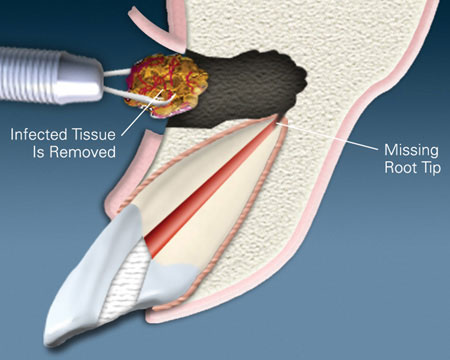
How Long Does Apicoectomy Last?
The longevity of an apicoectomy varies based on several factors, including:
- Oral Hygiene Practices: Good oral hygiene helps prevent infections and promotes healing.
- Underlying Health Conditions: Patients with health issues may require closer monitoring post-surgery.
- Follow-Up Care: Regular follow-up appointments are essential to monitor healing and ensure the procedure’s effectiveness.
With proper care, apicoectomy can provide long-lasting relief from dental problems and help preserve your natural teeth. Work closely with your dental professional for the best outcomes. If you have further questions about Apicoectomy, please contact us.
We also think you’ll like…
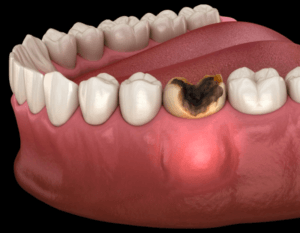
Pulp Necrosis
Pulp Necrosis What Is Pulp Necrosis? Pulp Necrosis is a dental condition that occurs when the innermost tissue of a tooth, known as the pulp,
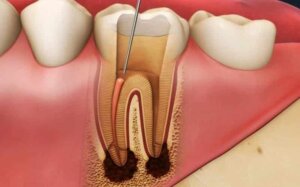
Failed Root Canal Treatment
Failed Root Canal Treatment What Is Failed Root Canal Treatment? Failed root canal treatment occurs when a tooth that has undergone root canal therapy continues
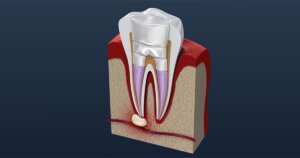
Root Canal Treatment
Root Canal Treatment What Is Root Canal Treatment? If you’ve been told that you need a Root Canal Treatment, you might be feeling a bit
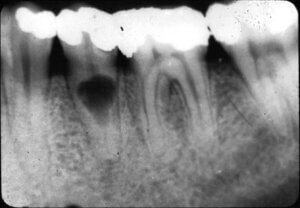
Internal Root Resorption
Internal Root Resorption What Is Internal Root Resorption? Internal root resorption is an uncommon dental condition where the inner structure of a tooth’s root begins

Dental Abscess
Dental Abscess What Is A Dental Abscess? A Dental Abscess is a painful infection that forms a collection of pus around a tooth or within
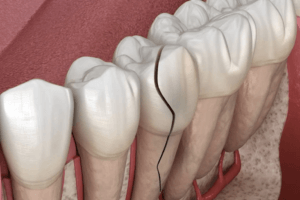
Crack Tooth Syndrome
Crack Tooth Syndrome What Is Crack Tooth Syndrome? Do you have unexplained dental pain but no obvious signs of decay or trauma? You could be

